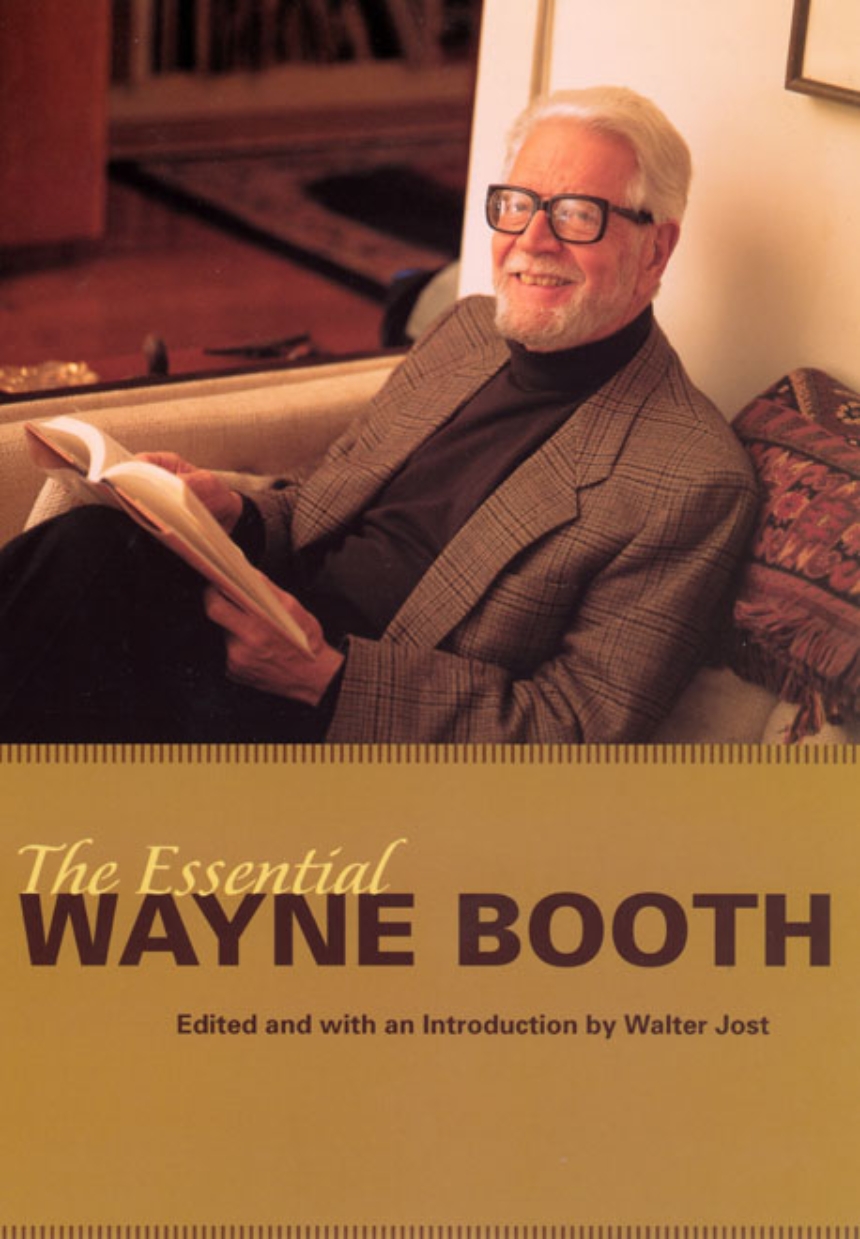The Essential Wayne Booth
Wayne Booth wrote some of the most influential and engaging criticism of our time, most notably the 1961 classic The Rhetoric of Fiction, a book that transformed literary criticism and became the standard reference point for advanced discussions of how fiction works, how authors make novels accessible, and how readers re-create texts.
While Booth’s work was formative to the study of literature, his essential writings have never been collected in a single volume—until now. Selected by Walter Jost in collaboration with Booth himself, the texts anthologized here present a picture of this indispensable critic’s contributions to literary and rhetorical studies. The selections range from memorable readings of Macbeth, Jane Austen, George Eliot, and Henry James to engagements with Booth’s intellectual heroes, such as Richard McKeon and Mikhail Bakhtin. But rhetoric, Booth’s abiding concern as a critic and thinker, provides the organizing principle of the anthology. The Essential Wayne Booth illuminates the scope of Booth’s rhetorical inquiry: the entire range of resources that human beings share for producing effects on one another. Whether about metaphors for our friendship with books or the two cultures of science and religion, the texts collected here always return to the techniques and ethics of our ways of communicating with each other—that is, to rhetoric.
The Essential Wayne Booth is a capstone to Booth’s long career and an eloquent reminder of the ways in which criticism can make us alive to the arts of writing, talking, and listening.
While Booth’s work was formative to the study of literature, his essential writings have never been collected in a single volume—until now. Selected by Walter Jost in collaboration with Booth himself, the texts anthologized here present a picture of this indispensable critic’s contributions to literary and rhetorical studies. The selections range from memorable readings of Macbeth, Jane Austen, George Eliot, and Henry James to engagements with Booth’s intellectual heroes, such as Richard McKeon and Mikhail Bakhtin. But rhetoric, Booth’s abiding concern as a critic and thinker, provides the organizing principle of the anthology. The Essential Wayne Booth illuminates the scope of Booth’s rhetorical inquiry: the entire range of resources that human beings share for producing effects on one another. Whether about metaphors for our friendship with books or the two cultures of science and religion, the texts collected here always return to the techniques and ethics of our ways of communicating with each other—that is, to rhetoric.
The Essential Wayne Booth is a capstone to Booth’s long career and an eloquent reminder of the ways in which criticism can make us alive to the arts of writing, talking, and listening.
344 pages | 4 tables | 6 x 9 | © 2006
Literature and Literary Criticism: General Criticism and Critical Theory
Reviews
Table of Contents
Introduction by Walter Jost
1. Macbeth as Tragic Hero
2. Control of Distance in Jane Austen’s Emma
3. The Rhetorical Stance
4. The Revival of Rhetoric
5. Metaphor as Rhetoric: The Problem of Evaluation (with Ten Literal "Theses")
6. The Empire of Irony
7. Richard McKeon’s Pluralism: The Path between Dogmatism and Relativism
8. How Bakhtin Woke Me Up
9. "The Way I Loved George Eliot": Friendship with Books as a Neglected Critical Metaphor
10. On Relocating Ethical Criticism
11. The Ethics of Form: Taking Flight with The Wings of the Dove
12. The Ethics of Teaching Literature
13. "Of the Standard of Moral Taste": Literary Criticism as Moral Inquiry
14. Rhetoric, Science, Religion
15. The Idea of a University—as Seen by a Rhetorician
16. For the Love of It: Spending, Wasting, and Redeeming Time
17. Coda: Mere Rhetoric, Rhetorology, and the Search for a Common Learning
Notes
Index
1. Macbeth as Tragic Hero
2. Control of Distance in Jane Austen’s Emma
3. The Rhetorical Stance
4. The Revival of Rhetoric
5. Metaphor as Rhetoric: The Problem of Evaluation (with Ten Literal "Theses")
6. The Empire of Irony
7. Richard McKeon’s Pluralism: The Path between Dogmatism and Relativism
8. How Bakhtin Woke Me Up
9. "The Way I Loved George Eliot": Friendship with Books as a Neglected Critical Metaphor
10. On Relocating Ethical Criticism
11. The Ethics of Form: Taking Flight with The Wings of the Dove
12. The Ethics of Teaching Literature
13. "Of the Standard of Moral Taste": Literary Criticism as Moral Inquiry
14. Rhetoric, Science, Religion
15. The Idea of a University—as Seen by a Rhetorician
16. For the Love of It: Spending, Wasting, and Redeeming Time
17. Coda: Mere Rhetoric, Rhetorology, and the Search for a Common Learning
Notes
Index
